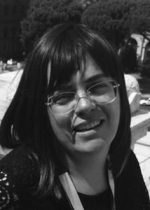אלבוים-גביזון מיכל, ד"ר

Background
Michal Elboim-Gabyzon is a full-time lecturer and faculty member in the Physical Therapy Department at the University of Haifa (UOH). She received a bachelor's degree in 1999, (with honors) and a master’s degree in 2005 in physical therapy from Tel Aviv University, and a PhD in 2011 from the University of Haifa. She completed post-doctoral studies at the Biorobotics and Biomechanics Lab at the Mechanical Engineering Faculty at the Technion, Israel (2012), and at the Neuromuscular Research Laboratory, Schulthess Clinic, Zurich, Switzerland (2014-2015).
Dr. Elboim-Gabyzon’s primary research areas are
1) Evidence Based Practice of Electro-physical Modalities (EPA). Within this wide topic she conducts both laboratory-based studies investigating the effects of different modality parameters on human response (e.g. determining optimal pulse parameters), and clinical intervention studies regarding the effectiveness of EPA modalities in various clinical situations (e.g. post-operative TENS on recovery in orthopedic conditions).
2) Physical therapy in geriatric acute orthopedics care. Her research in this area is carried out in a number of hospitals particularly in northern Israel and enables multi-disciplinary investigations addressing physical, cognitive as well as cultural determinants of recovery.
3) Acute orthopedics care and frailty of the elderly. In this field she focuses on the consequences of acute orthopedic events in geriatric patients which may lead to frailty. The research focuses on creating models, and technology-based measuring tools which may help identity frailty phenotype and promote early diagnosis of this syndrome.
Additionally, together with Prof Laufer (Emeritus) Dr. Elboim-Gabyzon initiated the founding of the Israeli Special Interest Group in Electrophysical Agents (ISIG-EAP). She is a member of the steering committee and secretary of this special interest group, and has represented it (along with Prof Laufer) at the WCPT Congress in Geneva (May 2019) when our Israeli Group was accepted as a member of the International Society for Electrophysical Agents in Physical Therapy (ISEAPT).
Dr. Elboim-Gabyzon is the student academic coordinator of the undergraduate students in the Physical Therapy Department; a committee member in the Faculty’s Ethical Review Board; and in the Faculty’s Teaching Committee.
Publications
More
My primary research areas are the following: 1) Evidence-based practice of electrophysical agents (EPAs): Within this broad area, I conduct laboratory-based studies investigating the effects of different modality parameters on human response (e.g., determining optimal pulse parameters), as well as clinical intervention studies on the effectiveness of EPA modalities in various clinical situations (e.g., effect of postoperative transcutaneous electrical nerve stimulation [TENS] on recovery from orthopedic conditions). 2) Physical therapy in acute orthopedic care for geriatric patients: My research in this area is carried out in hospitals, particularly in northern Israel, and involves multidisciplinary investigations addressing physical, cognitive, and cultural determinants of recovery. 3) Acute orthopedic care and fragility in the elderly living in the community taking into account the multicultural diversity of our Israeli society. My study in this field focuses on the consequences of internal and external stressors such as acute orthopedic events in geriatric patients, which may lead to fragility. My research focuses on creating models and technology-based measuring tools that can help identify the frailty phenotype and promote early diagnosis of this syndrome. I am particularly interested in the study of three significant transition points in the aging process that require identification: 1) transition from a non-frail to a frail state, 2) transition to a severely frail state with limited life expectancy and need for palliative care to manage symptoms, and 3) transition to terminal condition. My research field is mainly among older adults living in the community while emphasizing the multicultural diversity of the Israel society.

